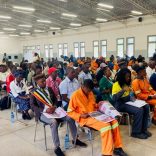Mozambique: Multi-sectoral team to curb street begging, support the homeless in Maputo - Watch
Mozambique: No NPO links to financing rebels were found; risk exists – report

FILE - For illustration purposes only. [File photo: Lusa]
A Mozambican government report on Non-Profit Organizations (NPOs) has concluded that there are ‘no links’ between them and terrorist financing, which affects the northern province of Cabo Delgado, but points to vulnerabilities.
‘No links and/or use of NPOs for terrorist financing were identified. Nor was evidence found of fraud and corruption practices in the NPO sector or crimes such as money laundering,’ reads the report, to which Lusa had access on Friday. The 2024 National Terrorist Financing Risk Assessment Report for the Non-Profit Organisations sector is an assessment made as part of the Mozambican government’s commitment as a member of the Financial Action Task Force (FATF) global network, which in October 2022 placed Mozambique on the ‘grey list’ of countries ‘under increased monitoring’.
The document recognises the ‘existence of terrorism in Mozambique by the terrorist group operating in Cabo Delgado province, called ASWJ [Ahlu Sunnah Wal Jamaah] and its link’ to the Islamic State.
It points out that ‘potentially’ ‘terrorist actors can abuse’ these organisations as ‘a vehicle for receiving financial resources from abroad for internal channelling’, by using ‘religious institutions, such as mosques and madrasahs, for recruitment and logistical support’, as well as the possibility of ‘terrorist supporters’ presenting themselves ‘falsely as humanitarian aid agencies to hide their activities’.
The report sampled 402 entities active in Mozambique, including associations (327), foundations (14), religious denominations (48) and other foreign NPOs, out of a total estimated universe of 5,074 organisations, mostly associations (4,341), but also religious denominations (361) and foundations (99).
Despite not finding ‘evidence’ to ‘conclude that Mozambican NPOs and/or those operating in the country’ are used to finance terrorism, it identifies three suspicious cases reported, currently being dealt with in justice, two in the preliminary stages and one under investigation, but all pointing to ‘a mere violation of prudential rules, a tax offence or, in the extreme, nothing’.
“The country is facing terrorist attacks in the northern region. Based on the perceptions gathered from the NPO survey, questionnaires to state institutions and existing literature, four potential inherent vulnerabilities were identified,’ it reads.
These are, at a low risk level, ‘donations and links abroad’ and ‘organisations with humanitarian and charitable purposes’, at a medium level organisations operating in or around risk zones, and at a medium/high level ‘informal, untraceable and/or cash financial transactions’.
Within the vulnerability of operations in risk zones, the report mentions ‘three suspicious cases’, namely that of a ‘religious-based’Non-Profit Organization [NPO] operating in Cabo Delgado in humanitarian actions and awarding scholarships, with ‘suspected links’ to the ASWJ group.
The report concludes, however, that ‘a significant number of the NPOs surveyed’, equivalent to 77% of the total, ‘have no income or their annual income is less’ than US$15,000 (€13,800), while 8% have between US$100,000 and US$499,999 (€91,820 to €459,000) and another 8% over US$500,000 (€459,000).
It adds that 63% of the NPOs surveyed ‘provide humanitarian support regularly or sometimes’ to ‘respond to natural disasters’, but ‘a substantial number of NPOs reported having links with abroad’.
‘External links are mostly related to receiving funds, goods or services from other countries,’ it says.
Among other recommendations, the report advocates that ‘regulation of foreign NPOs should be harmonised in line with international standards’, to ensure a ‘more adequate and rational registration and disclosure process’, as well as the introduction of a formal system to identify NPOs ‘likely to be at greater risk of terrorist financing abuse’.
Civil Society Organizations repudiate accusation of terrorist financing and demand GIFiM public clarification https://t.co/PIXN0MJzib pic.twitter.com/4g0VvE2rFt
— Cabo Delgado (@DelgadoCabo) June 8, 2024












Leave a Reply
Be the First to Comment!
You must be logged in to post a comment.
You must be logged in to post a comment.